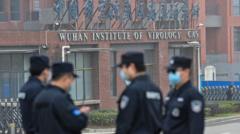Germany's foreign intelligence service, the BND, previously estimated an 80-90% probability that the coronavirus had accidentally leaked from a lab in China, according to recent reports by local media. Documents from two German newspapers indicate that in 2020, the BND analyzed this possibility as part of a confidential operation named Project Saaremaa but never made the assessment public.
The BND reportedly had evidence suggesting that the Wuhan Institute of Virology was conducting experiments to modify viruses to be more transmissible to humans. Despite this, the agency concluded that they lacked definitive proof to confirm the lab leak theory. China has consistently denied these allegations, advocating that the origins of COVID-19 should be determined through scientific investigation rather than political speculation. Chinese officials pointed to a World Health Organization (WHO) investigation, which deemed the lab leak scenario "extremely unlikely."
There remains no global consensus on how the COVID-19 pandemic originated. The lab leak hypothesis has sparked significant debate, drawing skepticism from numerous scientists who argue that there is inadequate evidence to support it. Meanwhile, interest in the theory has grown among some intelligence agencies. Earlier this year, the US CIA assessed that the virus is "more likely" to have originated from a lab than from animal transmission.
The BND had reportedly briefed the CIA about its findings late last year. In January, the CIA reiterated that the pandemic's origins were likely linked to human research activities but displayed "low confidence" in this assertion. Both the BND and outgoing German Chancellor Olaf Scholz have opted not to comment on the revelations.
China's Foreign Ministry emphasized its stance that the origins of COVID-19 should rely on scientific methods. They reiterated their position against any political manipulation surrounding the lab leak theory and highlighted the credibility of conclusions drawn from the WHO's investigations in Wuhan, which involved extensive discussions with scientists and lab evaluations.
The WHO's assessment came after an investigation team spent twelve days in Wuhan in early 2021, assessing the potential origins of the virus. Although their report declared the lab leak scenario to be "extremely unlikely," the findings have garnered skepticism, with some experts criticizing the brevity with which the lab leak theory was dismissed.
Proponents of the natural origin hypothesis, which has historically supported the view that COVID-19 derived from bats, contend that the virus likely passed to humans through an intermediary animal. However, this theory has been increasingly scrutinized, particularly since no creatures matching the genetic attributes of the virus have been identified, raising doubts about its validity and heightening calls for further investigation into the pandemic's origins.
The BND reportedly had evidence suggesting that the Wuhan Institute of Virology was conducting experiments to modify viruses to be more transmissible to humans. Despite this, the agency concluded that they lacked definitive proof to confirm the lab leak theory. China has consistently denied these allegations, advocating that the origins of COVID-19 should be determined through scientific investigation rather than political speculation. Chinese officials pointed to a World Health Organization (WHO) investigation, which deemed the lab leak scenario "extremely unlikely."
There remains no global consensus on how the COVID-19 pandemic originated. The lab leak hypothesis has sparked significant debate, drawing skepticism from numerous scientists who argue that there is inadequate evidence to support it. Meanwhile, interest in the theory has grown among some intelligence agencies. Earlier this year, the US CIA assessed that the virus is "more likely" to have originated from a lab than from animal transmission.
The BND had reportedly briefed the CIA about its findings late last year. In January, the CIA reiterated that the pandemic's origins were likely linked to human research activities but displayed "low confidence" in this assertion. Both the BND and outgoing German Chancellor Olaf Scholz have opted not to comment on the revelations.
China's Foreign Ministry emphasized its stance that the origins of COVID-19 should rely on scientific methods. They reiterated their position against any political manipulation surrounding the lab leak theory and highlighted the credibility of conclusions drawn from the WHO's investigations in Wuhan, which involved extensive discussions with scientists and lab evaluations.
The WHO's assessment came after an investigation team spent twelve days in Wuhan in early 2021, assessing the potential origins of the virus. Although their report declared the lab leak scenario to be "extremely unlikely," the findings have garnered skepticism, with some experts criticizing the brevity with which the lab leak theory was dismissed.
Proponents of the natural origin hypothesis, which has historically supported the view that COVID-19 derived from bats, contend that the virus likely passed to humans through an intermediary animal. However, this theory has been increasingly scrutinized, particularly since no creatures matching the genetic attributes of the virus have been identified, raising doubts about its validity and heightening calls for further investigation into the pandemic's origins.


















